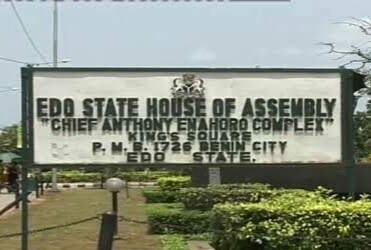Paragraph 1: Power Shift in Edo State House of Assembly
The political landscape of Edo State witnessed a significant shift on Monday, August 28, 2023, as the All Progressives Congress (APC) solidified its control over the State House of Assembly. This transition of power culminated in the appointment of new principal officers, reflecting the APC’s newly acquired majority status. Jonathan Aigbokhan, representing Esan West constituency, was named the Majority Leader, while Addeh Isibor and Mustapha Lucky assumed the roles of Deputy Majority Leader and Chief Whip, respectively. This reshuffling of leadership positions followed the defection of four lawmakers from the Peoples Democratic Party (PDP) and the Labour Party to the APC, increasing the party’s representation to 13 seats and reducing the PDP’s to 11. The position of Deputy Chief Whip was eliminated, as it was not officially recognized by the House. This position was previously held by Richard Edosa, who recently defected from the Labour Party to the APC.
Paragraph 2: Emphasis on Unity and Collaboration
Speaker of the House, Blessing Agbebaku, presided over the plenary session where the changes were announced. He emphasized the importance of unity and collaboration between the majority and minority parties, stressing that their shared responsibility to the people of Edo State transcended party lines. Agbebaku called for a concerted effort to support Governor Godwin Obaseki’s agenda for the state’s development, highlighting the need for a cohesive legislative body working in tandem with the executive branch. This call for unity underscored the Speaker’s commitment to ensuring a productive and harmonious working relationship between the two parties, despite the shift in power dynamics. He acknowledged the PDP’s right to submit its list of principal officers, further demonstrating his commitment to inclusive governance.
Paragraph 3: APC’s Demand for By-Elections
Concurrent with the leadership changes in the State Assembly, the Edo State chapter of the APC, led by Chairman Col. David Imuse (Rtd.), issued a strong statement demanding the Independent National Electoral Commission (INEC) conduct by-elections for two vacant federal legislative seats. These vacancies arose following the election of Godwin Obaseki as Governor and the subsequent resignation of Monday Okpebholo from the Edo Central Senatorial seat to contest the governorship election, which he won, and the resignation of Dennis Idahosa from his position as the representative of Ovia North East/South West Federal Constituency to become the deputy Governor. The APC expressed concern over the prolonged absence of representation for these constituencies, arguing that the delay was a violation of democratic principles and electoral guidelines.
Paragraph 4: Justification for Immediate By-Elections
In a statement released on Monday, the APC chairman emphasized the urgency of filling the vacant seats, highlighting the disenfranchisement of the affected constituencies. He argued that the delay in conducting the by-elections not only deprived the constituents of their right to representation but also undermined the integrity of the democratic process. The APC chairman stressed the importance of timely representation, stating that the continued absence of elected officials hampered the effective delivery of democratic dividends and hindered the progress of the affected communities. He characterized the delay as a disservice to the people and a breach of constitutional provisions.
Paragraph 5: Ultimatum and Alternative Proposal
The APC issued an ultimatum to INEC, urging the electoral body to take immediate action to schedule and conduct the by-elections. The party expressed its frustration at what it perceived as an unjustifiable delay, arguing that INEC’s inaction was eroding public trust in the electoral process. In a bold move, the APC chairman proposed an alternative solution: if INEC was unable to conduct the by-elections due to financial constraints or logistical challenges, the responsibility should be transferred to the Edo State Independent Electoral Commission (EDSIEC). This proposal underscored the APC’s determination to ensure the vacant seats were filled without further delay, even if it meant exploring alternative mechanisms for conducting the elections.
Paragraph 6: Implications for Democracy and Governance
The ongoing situation in Edo State highlights the critical importance of timely and effective representation in a democratic system. The APC’s insistence on holding by-elections reflects the party’s commitment to upholding democratic principles and ensuring that the voices of all constituents are heard. The delay in filling the vacant seats raises concerns about the potential for governance gaps and the erosion of public trust in the electoral process. The outcome of this situation will have significant implications for the future of democracy and governance in Edo State, setting a precedent for how similar scenarios are handled in the future. The call for urgent action underscores the need for a responsive and efficient electoral system that prioritizes the rights of citizens to participate in democratic processes.














